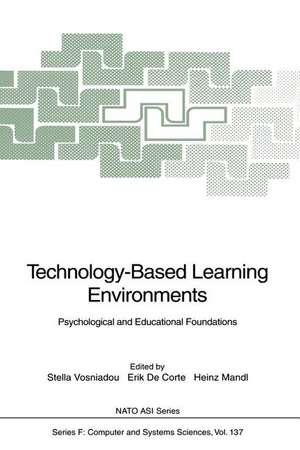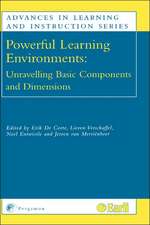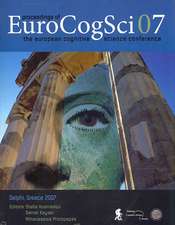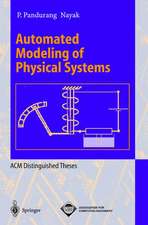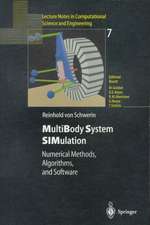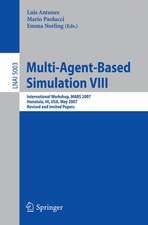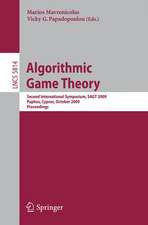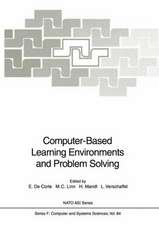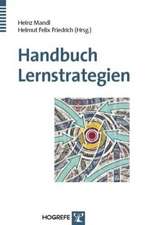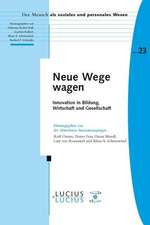Technology-Based Learning Environments: Psychological and Educational Foundations: NATO ASI Subseries F:, cartea 137
Editat de Stella Vosniadou, Erik De Corte, Heinz Mandlen Limba Engleză Paperback – 13 dec 2011
Din seria NATO ASI Subseries F:
- 20%
 Preț: 650.27 lei
Preț: 650.27 lei - 20%
 Preț: 668.55 lei
Preț: 668.55 lei - 20%
 Preț: 992.44 lei
Preț: 992.44 lei - 18%
 Preț: 1239.19 lei
Preț: 1239.19 lei - 20%
 Preț: 1922.81 lei
Preț: 1922.81 lei - 20%
 Preț: 654.37 lei
Preț: 654.37 lei - 18%
 Preț: 1234.00 lei
Preț: 1234.00 lei - 20%
 Preț: 709.78 lei
Preț: 709.78 lei - 20%
 Preț: 656.03 lei
Preț: 656.03 lei - 18%
 Preț: 1854.94 lei
Preț: 1854.94 lei - 20%
 Preț: 374.97 lei
Preț: 374.97 lei - 20%
 Preț: 991.94 lei
Preț: 991.94 lei - 20%
 Preț: 671.02 lei
Preț: 671.02 lei - 20%
 Preț: 1925.96 lei
Preț: 1925.96 lei - 20%
 Preț: 994.73 lei
Preț: 994.73 lei -
 Preț: 389.49 lei
Preț: 389.49 lei - 20%
 Preț: 657.99 lei
Preț: 657.99 lei - 20%
 Preț: 655.20 lei
Preț: 655.20 lei - 18%
 Preț: 1225.31 lei
Preț: 1225.31 lei - 18%
 Preț: 952.09 lei
Preț: 952.09 lei - 20%
 Preț: 332.06 lei
Preț: 332.06 lei - 20%
 Preț: 1284.47 lei
Preț: 1284.47 lei - 20%
 Preț: 644.81 lei
Preț: 644.81 lei -
 Preț: 395.85 lei
Preț: 395.85 lei - 18%
 Preț: 1221.07 lei
Preț: 1221.07 lei - 15%
 Preț: 643.34 lei
Preț: 643.34 lei - 20%
 Preț: 645.47 lei
Preț: 645.47 lei - 20%
 Preț: 1282.98 lei
Preț: 1282.98 lei - 20%
 Preț: 656.36 lei
Preț: 656.36 lei - 20%
 Preț: 1283.31 lei
Preț: 1283.31 lei - 20%
 Preț: 1924.15 lei
Preț: 1924.15 lei - 20%
 Preț: 362.24 lei
Preț: 362.24 lei
Preț: 646.95 lei
Preț vechi: 808.69 lei
-20% Nou
Puncte Express: 970
Preț estimativ în valută:
123.81€ • 134.44$ • 103.100£
123.81€ • 134.44$ • 103.100£
Carte tipărită la comandă
Livrare economică 22 aprilie-06 mai
Preluare comenzi: 021 569.72.76
Specificații
ISBN-13: 9783642791512
ISBN-10: 3642791514
Pagini: 324
Ilustrații: X, 302 p.
Dimensiuni: 155 x 235 x 17 mm
Greutate: 0.46 kg
Ediția:Softcover reprint of the original 1st ed. 1994
Editura: Springer Berlin, Heidelberg
Colecția Springer
Seria NATO ASI Subseries F:
Locul publicării:Berlin, Heidelberg, Germany
ISBN-10: 3642791514
Pagini: 324
Ilustrații: X, 302 p.
Dimensiuni: 155 x 235 x 17 mm
Greutate: 0.46 kg
Ediția:Softcover reprint of the original 1st ed. 1994
Editura: Springer Berlin, Heidelberg
Colecția Springer
Seria NATO ASI Subseries F:
Locul publicării:Berlin, Heidelberg, Germany
Public țintă
ResearchCuprins
Editors’ Introduction.- I Design Principles for Learning Environments.- From cognitive theory to educational technology.- Toward the integration of computers in powerful learning environment.- Learning with computer-based exploratory environments in science and mathematics.- Modelling, a means for expressing thinking: ESRC Tools for exploratory learning research programme.- Knowledge application in complex systems.- Internalization and Learning Environments.- Learning: From interactivity to cooperation.- Peer interactions among adolescents using computer networks in an international role playing exercise.- Implementing a model of cognitive development in an intelligent learning environment.- Differences in patterns: Studying computer enhanced learning environments.- II Using Educational Technology to Promote Conceptual Change in the Physical Sciences.- Multimedia environments for enhancing science instruction.- The Mars Mission Challenge: A generative problem-solving school science environment.- Studying and teaching model-based reasoning in science.- Promoting studies on conceptual change.- Diagnosing students’ physics knowledge and remediating learning difficulties: A computer-based approach.- Development of a learning environment for basic electricity.- Development of an information system to help conceptual change concerning the human nervous system.- Analysis of physics knowledge for learning environments.- Integrating computer software tools in learning environments for meaningful learning.- Ecoland: A hypermedia prototype for environmental education.- III Technology-Based Learning Environments for Knowledge Acquisition in Mathematics and in Language.- Multimedia environments for enhancing student learning in mathematics.- Tutoring mathematical text problems:From cognitive task analysis to didactic tools.- Less can be more: Unintelligent tutoring based on psychological theories and experimentation.- The use of an intermediate model for solving word problems.- Qualitative analysis of children’s learning of programming in the context of a developing culture of open-ended project work in a primary school.- Computer-assisted learning to read and write: A three-year longitudinal study.- Computer facilitations of the writing process.- Flow driven English course.- IV Taking into Consideration the Needs of the Learner.- Investigating the use of knowledge profiles in a flexible learning environment: Analyzing students’ prior knowledge states.- Knowledge and learning skill student model.- Semantic networks of action.- Representation systems in mathematics and science: The era of computers.- Use of graphics in computer aided learning in chemistry.- Effects of visible link-types on learning in hypertext systems.- Knowledge construction and acquisition in a hypermedia environment customized for learning purposes.- Hypertext learning environments and epistemic beliefs: A preliminary investigation.- Investigating motivation and cooperation in computer-assisted learning: A pilot study.
